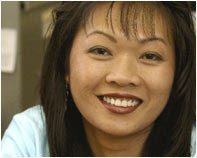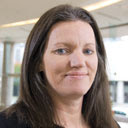 What a treat to have moderated the opening session of Uprooted: The International Migration of Children, the symposium that 2 student journals here at the University of California, Davis, School of Law (Martin Luther King, Jr. Hall) -- our Journal of Juvenile Law and Policy and our Journal of International Law and Policy -- cosponsored on Friday. (A preconference notice is here.)
What a treat to have moderated the opening session of Uprooted: The International Migration of Children, the symposium that 2 student journals here at the University of California, Davis, School of Law (Martin Luther King, Jr. Hall) -- our Journal of Juvenile Law and Policy and our Journal of International Law and Policy -- cosponsored on Friday. (A preconference notice is here.)
Titled "The International Context that Pushes Migration," the session provided a rich overview of the causes, conditions, and effects on families of transnational migration trends.
 1st up was our colleague Chivy Sok (right), whose career in human rights advocacy includes current service as a member of the Steering Committee of the Ginetta Sagan Fund of Amnesty International USA, as well as prior human rights center leadership at Columbia University and the University of Iowa. Chivy told of her own childhood picking onions for hours in U.S. fields alongside others in her Cambodian refugee family. Chivy then placed her experience in context. More than 200 million children labor worldwide, she said. Three-quarters work in agriculture. Agricultural hazards -- injuries from equipment, harms from pesticides -- constitute a leading cause of death among children. Many of these children have no access to education, to health care, even to basic hygiene. Sok pointed to the Children’s Act for Responsible Employment, legislation that U.S. Rep. Lucille Roybal-Allard (D-Calif.) introduced in Congress last fall, as a potential means to address these problems.
1st up was our colleague Chivy Sok (right), whose career in human rights advocacy includes current service as a member of the Steering Committee of the Ginetta Sagan Fund of Amnesty International USA, as well as prior human rights center leadership at Columbia University and the University of Iowa. Chivy told of her own childhood picking onions for hours in U.S. fields alongside others in her Cambodian refugee family. Chivy then placed her experience in context. More than 200 million children labor worldwide, she said. Three-quarters work in agriculture. Agricultural hazards -- injuries from equipment, harms from pesticides -- constitute a leading cause of death among children. Many of these children have no access to education, to health care, even to basic hygiene. Sok pointed to the Children’s Act for Responsible Employment, legislation that U.S. Rep. Lucille Roybal-Allard (D-Calif.) introduced in Congress last fall, as a potential means to address these problems.
 Following Chivy was Jayne E. Fleming (left), Pro Bono Counsel at Reed Smith in San Francisco and the subject of a recent profile in the National Law Journal. (photo credit) Jayne recounted the forces of migration through stories about clients who live and work at a garbage dump in Guatemala. Economic forces of course play a role, she said, adding:
Following Chivy was Jayne E. Fleming (left), Pro Bono Counsel at Reed Smith in San Francisco and the subject of a recent profile in the National Law Journal. (photo credit) Jayne recounted the forces of migration through stories about clients who live and work at a garbage dump in Guatemala. Economic forces of course play a role, she said, adding:
Extreme poverty is absolutely a human rights violation.
Other forces of migration also emerged during the session, among them: implementation of the Central American Free Trade Agreement; political violence and armed conflict; family disintegration; sexual exploitation or incest.
 Yet another force was at the center of remarks by the session's 3d speaker, Dr. Rhacel Salazar Parreñas (right). Some women migrate not out of sheer desperation, she said, but out of desire to improve their family's economic and social mobility. Professor of American Studies and Sociology at Brown University, Rhacel told what she'd learned her ethnographic research on globalized domestic workers. She focused on how laws break up families, compelling mothers to leave their children behind when go abroad to work. Once there, mothers find themselves infantilized by law -- assigned the legal status not of an employee, but rather of a member of the employer's family. They must depend on employers to treat them well, and they discover, when employers do not, that national labor laws do not protect them. This vulnerable status prevails in countries that pride themselves on human rights records -- Rhacel named Denmark and Sweden in particular -- as well as in those that do not. One reason? A "maternalist ideology" by which "various states are in denial that mothers are leaving the home," and so fail to take measures to protect the migrant domestic workers who care for the home in their stead.
Yet another force was at the center of remarks by the session's 3d speaker, Dr. Rhacel Salazar Parreñas (right). Some women migrate not out of sheer desperation, she said, but out of desire to improve their family's economic and social mobility. Professor of American Studies and Sociology at Brown University, Rhacel told what she'd learned her ethnographic research on globalized domestic workers. She focused on how laws break up families, compelling mothers to leave their children behind when go abroad to work. Once there, mothers find themselves infantilized by law -- assigned the legal status not of an employee, but rather of a member of the employer's family. They must depend on employers to treat them well, and they discover, when employers do not, that national labor laws do not protect them. This vulnerable status prevails in countries that pride themselves on human rights records -- Rhacel named Denmark and Sweden in particular -- as well as in those that do not. One reason? A "maternalist ideology" by which "various states are in denial that mothers are leaving the home," and so fail to take measures to protect the migrant domestic workers who care for the home in their stead.
Kudos to these excellent speakers, to journal editors Eve Epstein and Monica Feltz and their staffs, and responsible for putting together this stimulating panel.
(Cross-posted at IntLawGrrls)